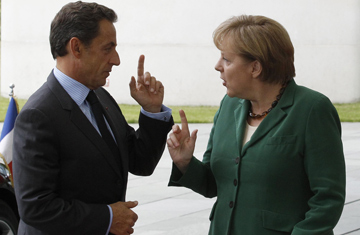
German Chancellor Angela Merkel welcomes France's President Nicolas Sarkozy before talks in Berlin, July 20, 2011
As they paraded out of their summit chamber late Thursday to hail their new €109 billion ($157 billion) debt deal for Greece, Europe's leaders all wore bullish I-told-you-so expressions, aimed squarely at the doubters who questioned whether there was any political will left to save the beleaguered euro from oblivion.
The agreement to restructure Greece's crippling debt came after weeks of dithering by the 17 euro-zone governments. But after the announcement of the agreement in Brussels Thursday, French President Nicolas Sarkozy called the decisions Europe had taken to protect Greece "mighty and weighty." German Chancellor Angela Merkel added that the deal, struck at the end of an eight-hour summit, "means more certainty for our common currency and so a more solid basis for our business and our economy in general." It also meant that after nearly two years of often ineffective responses to its financial calamities, the euro zone appeared to be moving toward the sort of fiscal cohesion that supporters hope will leave it far better able to deal with such crises in the future.
The 16-point package includes an agreement by Greece's private-sector creditors to accept a write-down of about €37 billion ($53 billion) through debt swaps and rollovers. This is seen as a victory for Merkel, who had long argued that private lenders should take a hit on the debt alongside governments. The process is likely to trigger a selective default, as private investors "voluntarily" agree to the haircuts. But it's still a default as far as ratings agencies are concerned, which the European Central Bank had attempted to avoid at all costs. "The demand to prevent a selective default has been removed," Dutch Finance Minister Jan Kees de Jager said.
While the European Financial Stability Facility, the rescue fund set up last year, will not receive new funding, it will be allowed to lend to any countries without a bailout currently in place and to recapitalize struggling banks. "We have agreed to create the beginnings of a European Monetary Fund," Sarkozy said.
The plan also includes lower interest rates on existing bailout loans for Greece, Ireland and Portugal (about 3.5%); repayment schedules extended from seven years up to 30; bigger steps toward closer financial integration; a €20 billion recapitalization of Greek banks and a "Marshall Plan" of European public investment to help revive the Greek economy. "We needed a credible package. We have a credible package," said European Commission President José Manuel Barroso.
European Council President Herman van Rompuy, who chaired the meeting, said the plan addressed the euro-zone leaders' key concern: that Greece's contagion would spread to other vulnerable economies like Spain's and Italy's. "We created a solid firewall and better fire-brigade equipment," he said.
There is, however, a nagging sense of déjà vu about the deal. It was only in May of last year that Greece was granted a €110 billion ($160 billion) bailout after another drawn-out Brussels summit that was supposed to quell the markets' swirls. But since then, Greek debt has soared to €340 billion ($490 billion) — nearly 170% of its GDP — while its economy has slumped.
As recently as last month, euro-zone leaders had hoped to have more time to figure out the details of a second Greek bailout, which would have included a soft restructuring of Greece's debt sometime in 2014. But their plans were shattered by the spread of financial turmoil to Italy, a country too big to bail out, and to Spain, with yields on the bonds of both countries reaching historic highs.
Nonetheless, the key breakthrough within the euro zone came the night before the leaders met in Brussels: on Wednesday Sarkozy flew to Berlin for seven hours of talks with Merkel to hammer out a deal between them on how to handle losses suffered by Greece's private creditors. By then, markets had become so jittery that U.S. President Barack Obama felt compelled to phone Merkel to express his concerns about the crisis. Even Britain's Chancellor of the Exchequer George Osborne, vehemently opposed to joining the euro, appealed to euro-zone leaders to agree on further reforms, saying the "remorseless logic" of monetary union demanded greater fiscal union, including Europe-wide coordination on taxes and spending.
One of the 16 items in the summit deal, which may prove critical, is a pledge by the euro-zone leaders to work on better crisis management. Part of the reason for the euro zone's fumbling response to the debt crisis, now nearing the end of its second year, is that its leaders had few economic levers to pull. If it seemed policymakers and officials were making it up as they went along, that is because they probably were.
Momentous though the deal may be, it is still essentially buying the euro zone time to consolidate its financial system and isolate Greece from other vulnerable members. But buying time might give Europe's governments a chance to work more seriously on chipping away at their mountains of debt. With the cover of long bond maturities and lower interest rates, they may be able to focus on building sustainable economic growth rather than following the current policy vogue of painful — and sometimes counterproductive — austerity measures. Significantly, markets reacted positively to the summit agreement: world stocks and the euro rose after news of a plan seeped out.
The summit agreement may not be a huge leap forward, but it is a baby step that takes the euro zone down the path toward fiscal integration and a monetary union. Whether the euro-zone leaders can maintain their resolve over the coming months and years is another matter.
